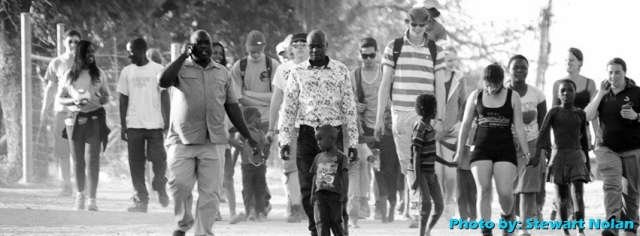Tourism can improve local living standards, whilst uncontrolled development or interaction with tourists can be destabilising to communities.
Operating tourism from a basis of respect for indigenous culture, supporting social development initiatives and considering, on an ongoing basis, the impacts tourism on the communities in which one operates are key to achieving high levels of success in this area.

Whilst the broader issues pertaining to benefits from tourism accruing to local communities are relevant to the tourism industry in general, they are particularly important to wildlife tourism. The majority of wildlife tourism takes place in rural areas where the lack of other opportunities means that opportunities or problems arising from wildlife tourism can make a real difference to people’s lives. These include:
• The close interdependence between local communities and the wildlife/natural resource base upon which wildlife tourism relies.
• The costs of living with wildlife fall heavily on local people (e.g. crop raiding by elephants, deaths of people).
All too often local communities suffer the negative impacts of wildlife tourism in the form of erosion of their culture, human/wildlife conflicts and competition for scarce resources etc, without always benefiting from the potential positives that an influx of wildlife tourists from the developed world has the power to bring. Wildlife tourism experiences must ensure that local people benefit financially and/or in terms of their quality of life from tourism and that any socio-cultural impacts are minimised.
In so far as indigenous cultures and communities are concerned there are a number of critical elements, which form the basis of socially responsible tourism. Some of these include:
• Respect For Local Culture
This encompasses:
o Negotiating with local communities visited regarding issues of group size, what activities are acceptable and appropriate.
o Ensuring visitors are informed of local customs, traditions and appropriate behaviour.
o Ensuring that the hosts are at ease with cameras and videos and to ensure visitors ask permission before taking photographs and video.
o Using local guides wherever possible.
o Ensuring open and honest relationships that reflect the principle of transparency
• Create a Tourism Culture
Creating a tourism culture in South Africa truly makes “Tourism Everybody’s Business”. To this end one should endeavour to:
o Embrace tourism initiatives that are dedicated to promoting tourism in South Africa and at the same time are applicable and appropriate to the communities in which it operates.
o Work with other tourism organisations that are dedicated to the same objectives.
• Identify Potential Impacts
Playing an active role in identifying potential positive and negative impacts ensures that:
o Host communities are aware of the potential negative impacts of tourism and one can then assist them in making informed decisions about tourism development.
o The positive impacts of tourism are embraced in such a way as to achieve maximum benefit for all by all.
• Maximise Benefits to Local People & Local Businesses
Understanding that tourism can bring significant benefits to local people and local businesses if managed positively will maximise benefits by:
o Adopting a fair and equitable employment policy.
o Adopting employment practices with no discrimination according to gender, ethnicity or colour.
o Offering local people employment in all areas of the business and paying fair and competitive wages.
o Providing training and career progression opportunities.
o Purchasing locally produced goods and services that benefit the wider local community where possible.
o Promoting and supporting community-based tourism initiatives/ enterprises.
o Where possible ensuring that a local guide/chaperone accompanies all group visits to local communities.
o Contributing financially towards projects that improve the welfare of the local community.
• Support Local Community Projects
For responsible travellers part of the process of making a difference is to witness or experience the project they are supporting. Therefore it is important to:
• Involve visitors, in a meaningful way, in community projects that are included in promoted itineraries that is not “voyeuristic”.
• Provide direct mentoring through the business or indirectly through volunteers and other NGOs.
Andrew Anderson
Click here for more information on responsible travel.


